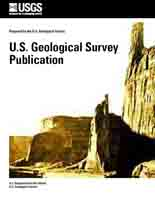In 2001, the National Guard Bureau and the U.S. Geological Survey began a project to compile hydrogeologic data and determine presence or absence of soil, surface-water, and ground-water contamination at the Idaho Army National Guard Orchard Training Area in southwestern Idaho. Between June 2002 and April 2003, a total of 114 soil, surface-water, ground-water, precipitation, or dust samples were collected from 68 sample sites (65 different locations) in the Orchard Training Area (OTA) or along the vehicle corridor to the OTA. Soil and water samples were analyzed for concentrations of selected total trace metals, major ions, nutrients, explosive compounds, semivolatile organics, and petroleum hydrocarbons. Water samples also were analyzed for concentrations of selected dissolved trace metals and major ions.
Distinguishing naturally occurring large concentrations of trace metals, major ions, and nutrients from contamination related to land and water uses at the OTA was difficult. There were no historical analyses for this area to compare with modern data, and although samples were collected from 65 locations in and near the OTA, sampled areas represented only a small part of the complex OTA land-use areas and soil types. For naturally occurring compounds, several assumptions were made?anomalously large concentrations, when tied to known land uses, may indicate presence of contamination; naturally occurring concentrations cannot be separated from contamination concentrations in mid- and lower ranges of data; and smallest concentrations may represent the lowest naturally occurring range of concentrations and (or) the absence of contaminants related to land and water uses. Presence of explosive, semivolatile organic (SVOC), and petroleum hydrocarbon compounds in samples indicates contamination from land and water uses.
In areas along the vehicle corridor and major access roads within the OTA, most trace metal, major ion, and nutrient concentrations in soil samples were not in the upper 10th percentile of data, but concentrations of 25 metals, ions, or nutrients were in the upper 10th percentile in a puddle sample near the heavy equipment maneuvering area, MPRC-H. The largest concentrations of tin, ammonia, and nitrite plus nitrate (as nitrogen) in water from the OTA were detected in a sample from this puddle. Petroleum hydrocarbons were the most common contaminant, detected in all soil and surface-water samples. An SVOC, bis (2-ethylhexyl) phthalate, a plasticizer, was detected at a site along the vehicle corridor.
In Maneuver Areas within the OTA, many soil samples contained at least one trace metal, major ion, or nutrient in the upper 10th percentile of data, and the largest concentrations of cobalt, iron, mercury, titanium, sodium, ammonia, or total phosphorus were detected in 6 of 13 soil samples outside the Tadpole Lake area. The largest concentrations of aluminum, arsenic, beryllium, nickel, selenium, silver, strontium, thallium, vanadium, chloride, potassium, sulfate, and nitrite plus nitrate were detected in soil samples from the Tadpole Lake area. Water from Tadpole Lake contained the largest total concentrations of 19 trace metals, 4 major ions, and 1 nutrient. Petroleum hydrocarbons were detected in 5 soil samples and water from Tadpole Lake. SVOCs related to combustion of fuel or plasticizers were detected in 1 soil sample. Explosive compounds were detected in 1 precipitation sample.In the
Impact Area within the OTA, most soil samples contained at least one trace metal, major ion, or nutrient in the upper 10th percentile of data, and the largest concentrations of barium, chromium, copper, manganese, lead, or orthophosphate were detected in 6 of the 18 soil samples. Petroleum hydrocarbons were detected in 4 soil samples, SVOCs in 6 samples, and explosive compounds in 4 samples.
In the mobilization and training equipment site (MATES) compound adjacent to the OTA, all soil and water samples contained at lea


